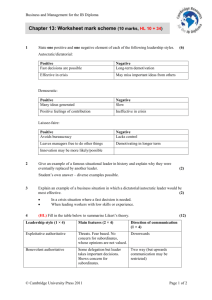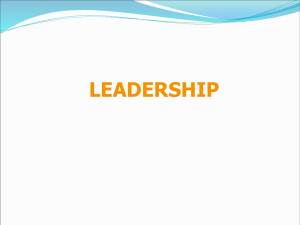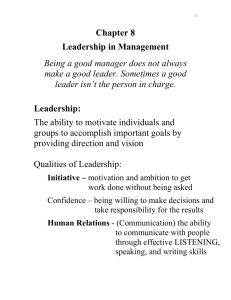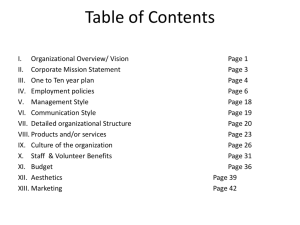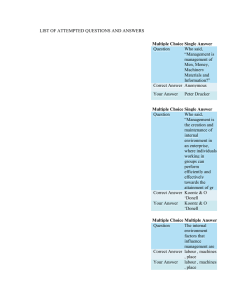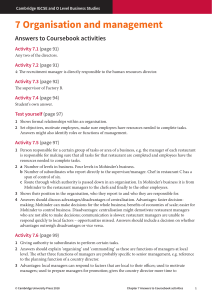diversity
advertisement
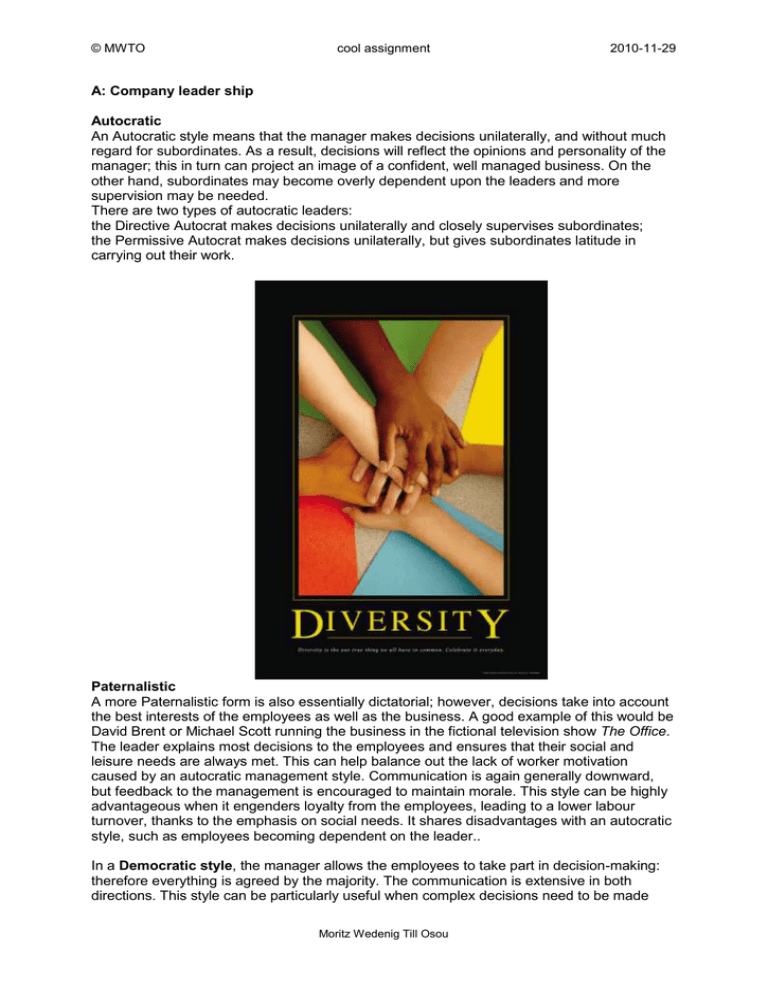
© MWTO cool assignment 2010-11-29 A: Company leader ship Autocratic An Autocratic style means that the manager makes decisions unilaterally, and without much regard for subordinates. As a result, decisions will reflect the opinions and personality of the manager; this in turn can project an image of a confident, well managed business. On the other hand, subordinates may become overly dependent upon the leaders and more supervision may be needed. There are two types of autocratic leaders: the Directive Autocrat makes decisions unilaterally and closely supervises subordinates; the Permissive Autocrat makes decisions unilaterally, but gives subordinates latitude in carrying out their work. Paternalistic A more Paternalistic form is also essentially dictatorial; however, decisions take into account the best interests of the employees as well as the business. A good example of this would be David Brent or Michael Scott running the business in the fictional television show The Office. The leader explains most decisions to the employees and ensures that their social and leisure needs are always met. This can help balance out the lack of worker motivation caused by an autocratic management style. Communication is again generally downward, but feedback to the management is encouraged to maintain morale. This style can be highly advantageous when it engenders loyalty from the employees, leading to a lower labour turnover, thanks to the emphasis on social needs. It shares disadvantages with an autocratic style, such as employees becoming dependent on the leader.. In a Democratic style, the manager allows the employees to take part in decision-making: therefore everything is agreed by the majority. The communication is extensive in both directions. This style can be particularly useful when complex decisions need to be made Moritz Wedenig Till Osou © MWTO cool assignment 2010-11-29 that require a range of specialist skills: for example, when a new ICT (Information and communications technology) system needs to be put in place. From the overall business's point of view, job satisfaction and quality of work will improve. As the autocratic leaders, democratic leaders are also two types i.e. permissive and directive extensive majority particularly require upper overall improve permissive directive aufwändig Mehrheit genau/besonders erfordern obere allgemein etw. Aufbessern erlaubend/tolerant Richtlinie/Anordnung In a Laissez-fair leadership style, the staff manage their own areas of the business. They define their work, their business and their organisation for themselves. The style brings out the best in highly professional and creative groups of employees. The advantages are the staff is freelance and the working atmosphere is very good. A big disadvantage is that the tempo where the staff make a decision is very low. www.wikipedia.org Voclist: unilaterally subordinates confident overly paternalistic | | | | | einseitig Befehlsempfänger selbstsicher all zu sehr Vormundschaft Diversity management: Cultural diversity includes the range of ways in which people experience a group identity, which includes gender, sexual orientation, race, ethnic origin and age. It is not almost easy for a company to handle with cultural diversities. Moritz Wedenig Till Osou © MWTO cool assignment 2010-11-29 Diversity is beneficial to both the organization and the members. Diversity brings substantial potential benefits such as better decision making and improved problem solving, greater creativity and innovation, which leads to improve product development, and more successful marketing to different types of customers. Examples: Migration Sexuality Religion Skin colour Age Style Culture Moritz Wedenig Till Osou
